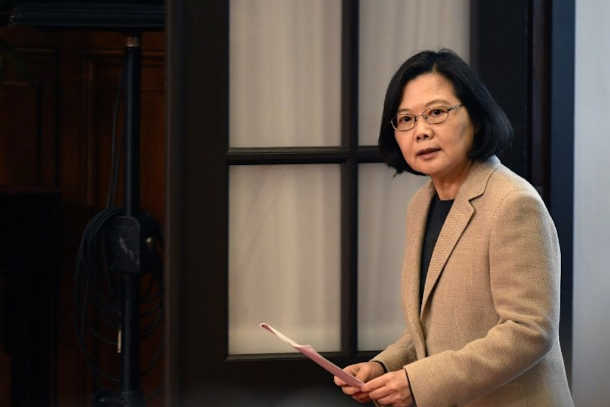
Taiwan's President Tsai Ing-wen arrives for a press conference at the Presidential Palace in Taipei after the national flag raising ceremony on Jan. 1. (Photo by Sam Yeh/AFP)
Taiwan President Tsai Ing-wen discussed her country's struggle for and love of democracy and the threat of military force from China, among other issues in a letter to Pope Francis in response to his message marking the 52nd World Day of Peace.
The letter, which echoed some of the thoughts contained in her letter to the pope on the same occasion two years earlier, was recently posted on the website of the Office of the President.
Tsai also wrote of her admiration for the example set by late Vietnamese Cardinal Francois-Xavier Nguyen Van Thuan, who the pope cited in his message.
The cardinal was persecuted for his religious beliefs in 1975 after the Vietnamese Communist Party ascended to power. He was later imprisoned without trial for 13 years.
After his release, he was appointed to serve as president of the Pontifical Council for Justice and Peace. The late Pope St. John Paul II called him a "witness to hope."
Cardinal Nguyen visited Taiwan in the year 2000 and Tsai said his experience gave "tremendous spiritual encouragement to the people of Taiwan, as it resonates with our country's predicament and the belief we have maintained in freedom and democracy despite longstanding suppression and isolation in the international arena."
Tsai continued that Taiwan is recognized by only 17 countries, including the Holy See, but "has never taken a vengeful stance in response."
On the contrary, Taiwan actively responds to calls for international humanitarian assistance, promotes environmental protection and sustainable development around the world, and prevents human trafficking.
Tsai also mentioned her interview with Agence France-Presse (AFP) last June, in which she talked about her views on China's constant suppression of what it regards as a renegade province.
"In response, I said that the best term to describe Taiwan is resilience, not because we have the wherewithal to compete with China in an arms race or a trade war, but because our firm commitment to democracy and human rights will lead us to a prosperous future," she said.
She said that the same spirit was shown by Nobel Peace Prize laureate Liu Xiaobo, who was "imprisoned until death for allegedly inciting subversion of state power" but still stressed, "he had no enemies and harbored no hatred, and expressed optimism that a free China would emerge."
"These sentiments were based on his belief that no force would be able to impede the people's desire for and the pursuit of freedom, as well as his intense hope that the rule of law and human rights would eventually prevail in China.
"Experiencing great agony and paying with his own life, Liu Xiaobo gave expression to mankind's humble yearning with regard to politics, hoping that in his own country different values, philosophies, belief systems, and political views would compete with each other yet coexist peacefully," she wrote.
Tsai said democracy and freedom were hard-won in Taiwan, but that it deeply cherished both in contrast to life under an authoritarian system.
"History teaches us that war and violence are never the solutions. Politicians should abandon rigid positions of antagonism, demonstrate wisdom, and create conflict resolution mechanisms based on rational dialogue," she emphasized.
And as president, she felt the urgent need to "make sure that Taiwan can survive and develop in a highly volatile global environment."
She laid out four elements that must be "the most basic and crucial foundation for the positive development of cross-strait relations."
"China must face the reality of the existence of Taiwan; respect the collective commitment of the Taiwanese people to freedom and democracy; handle cross-strait differences peacefully on the basis of equality; and recognize that negotiations must be conducted by governments or government-authorized agencies," she said.
Furthermore, she said that, "China has not relinquished its threat to invade Taiwan by force" and "continues to suppress Taiwan's presence in the international arena, aiming to diminish our status therein."
French poet Charles Péguy, whom the pope also referred to, "shows us that human freedom, equality, and dignity are core values that, in the end, will always supersede the constraints imposed by any political ideology," Tsai said.
"We believe that the spirit of peace will certainly overcome the law of violence," she said.


